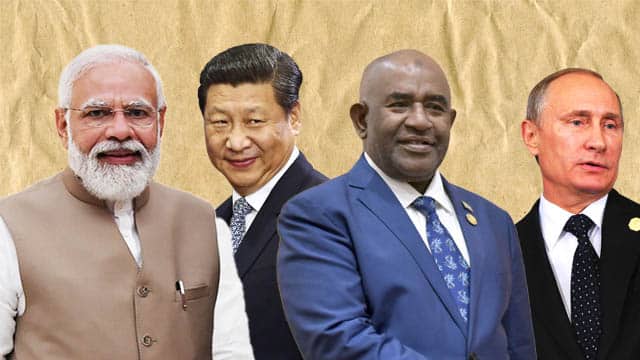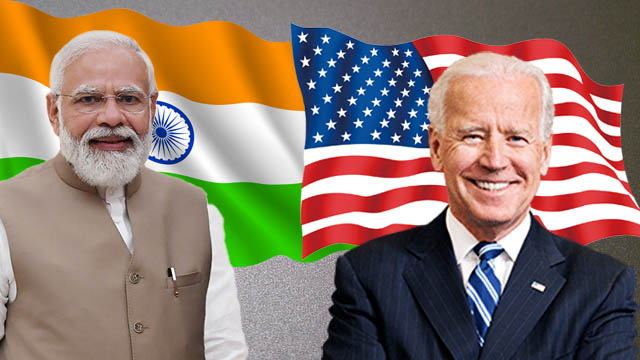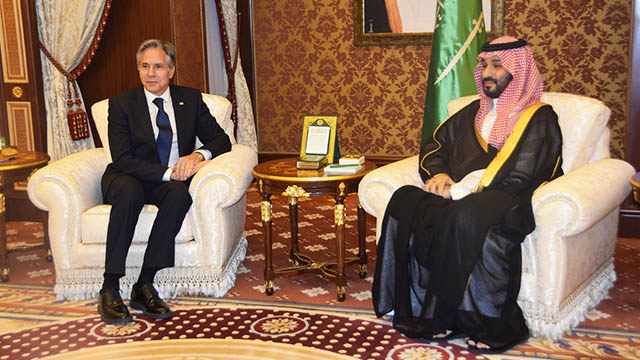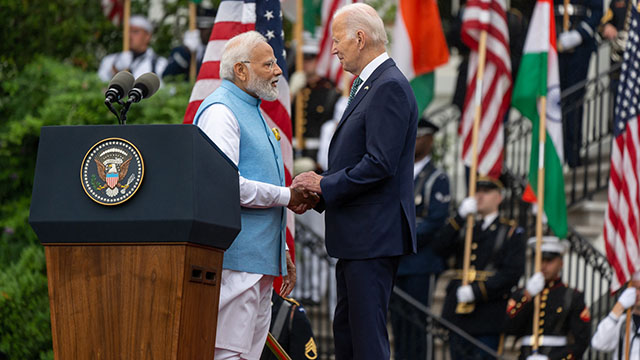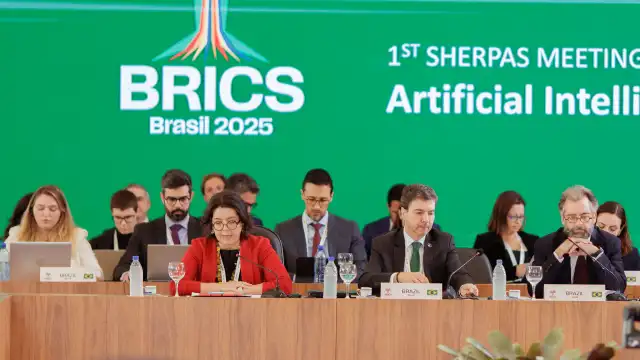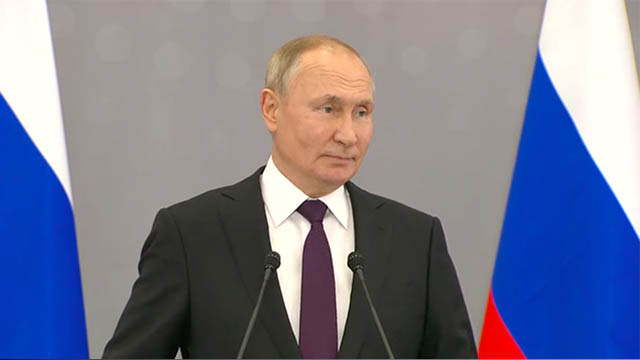- The unknown facts behind the African Union’s G20 membership bid exhibit how Africa is reshaping global geopolitical dynamics and ending neocolonialism.
For the last few days, geopolitical circles have been abuzz with the announcement of the inclusion of the African Union in the Group of 20 (G20) countries. Foreign policy experts across the world have dedicated countless columns discussing the implications of the African Union’s G20 membership.
Indian Prime Minister Narendra Modi emerged as a central character vital to it – owing to the fact that the 2023 G20 Summit will be held in New Delhi on September 9th-10th. What remains under wraps is how the African Union reached this stage. Most importantly, what potential does the African Union’s G20 membership hold for BRICS nations, who have supported its bid?
Spurred by growing discontent against neocolonial exploitation, manifested through a spree of coup d’états in several West African countries, and the increasing influence of the Chinese and Russians on the continent, exhibited in the growing engagement between them and the African countries, the West now realises the need to bring the African Union into its corner.
Hence it’s stamp of approval for the inclusion of the 55-country-strong African Union in the G20. The recent discussion between the African countries’ leaders and US President Joe Biden confirmed this, as the US announced its support for a cause both China and Russia, its geopolitical adversaries, have been promoting.
On its part, India, which was known to toe the line of the West is only implementing the decision of the BRICS — consisting of Brazil, Russia, India, China and South Africa—adopted during the group’s recently held 15th Summit in Johannesburg.
But what’s notable is that India is doing it only after the West has, on principle, approved the move. What has so far evaded discussion in international circles is the chain of events behind the announcement – the vested interests of the West in keeping the African Union ostracised so far, how Africa is rising against the French neo-colonial setup and more importantly, years of lobbying and international support from countries like China and Russia to the representation from Africa.
Equally important is the strategic position that Africa finds itself in the new world order and its appeal to the new emerging power bloc BRICS, which has made the latter put its total weight behind the African nations to have their voice—this time at the elusive G20.
The vested interests of the West
The African Union has been trying to become a G20 member since 1999. However, it couldn’t do so because the West didn’t allow the African countries any room in such forums, which they are keen to control.
In September 2022, Senegalese President and African Union Chairman Macky Sall advocated for G20 membership while addressing the United Nations General Assembly (UNGA).
“I would like to remind you of our request for the African Union to be granted a seat within the G20, so that Africa can, at last, be represented where decisions are taken that affect 1,400,000,000 Africans”, Sall said at the UNGA.
However, as most African countries either maintained neutrality or supported Russia’s special military operations in Ukraine, the West remained non-committal in admitting the African Union into the G20.
The hypocrisy of the West was exhibited in the fact that while European Union members like France, Germany and Italy are members of the G20, the union itself also holds a separate membership to represent 27 countries.
In that comparison, the 1.4bn people of 55 countries, collectively representing the 11th-largest GDP of the world worth $2.26 trillion, have been excluded from the G20 forum, which appears to be a case of sheer discrimination.
Soon after a spree of coup d’états swept countries like Burkina Faso, Gabon, Mali and Niger, exhibiting the people’s discontent against the West’s neocolonial exploitation of the African countries, the West tactically supported the inclusion of the African Union into the G20.
Countering the West’s narrative
In the current global geopolitical matrix, Africa has occupied an important position, as the major powers are seeking to increase their influence on the continent impoverished by colonial plundering by the West.
In their bid to compete against the West, countries like China and Russia, have over time increased their engagement in Africa. They have collectively been demanding the inclusion of the African Union in crucial global forums and initiatives like China’s Belt and Road Initiative (BRI).
If one were to track China’s role in advocacy for African Union members, an important event to note would be the November 2022 G20 Summit in Bali.
It was on Chinese President Xi Jinping’s insistence that Indonesian President Joko Widodo had agreed to invite the African Union to the G20 summit. Despite best efforts though, the membership of the bloc was not finalised then.
For China, the BRI’s success lies in getting more African countries on board the ambitious project. Xi has in the past supported the African Union’s Agenda 2063.
“China will continue to support Africa in speaking with one voice on international affairs and continuously elevating its international standing. China will work actively at the G20 Summit next month to support the AU’s full membership in the group”, Xi said in August.
Pitching for the African Union’s G20 membership in August 2022, Chinese Foreign Minister Wang Yi emphasised that the West resorts to bully the continent to exert its neocolonial hegemony.
Despite the “Chinese debt trap” conspiracy theory being peddled by the West’s mainstream press, the Chinese and African cooperation is improving.
China claims that it provides loans and restructures them accordingly to remove the bottlenecks of lack of funds that hinder the developmental aspirations of the African countries.
China actively participated in the G20 Debt Service Suspension Initiative, signed agreements or reached consensuses with 19 African countries on debt relief and suspended the most debt service payments among G20 members.
It has also been actively engaged in the case-by-case debt treatment for Chad, Ethiopia and Zambia under the G20 Common Framework.
On the trade front, China has pushed for higher imports from Africa, bringing its trading with the continent up by 11% in 2022. The China-Africa trade reached $282bn in 2022. China’s exports to Africa were $164.49bn, according to Chinese customs authorities, while imports reached $117.51bn.
Moreover, Xi announced at the Eighth Ministerial Conference of the Forum on China-Africa Cooperation, held in November 2021, that China would channel to African countries $10bn from its share of the International Monetary Fund’s (IMF) new allocation of Special Drawing Rights.
Contrary to the “Chinese debt trap”, data shows that loans from multilateral agencies and creditors like the World Bank and the IMF form two-thirds of the total debt of Africa.
Moreover, the interest rates of the Chinese debts to African countries—both public and private—are nearly half of what the private lenders are charging these governments.
China, on the contrary, has been claiming that it’s vocal about the restructuring of the debts to provide relief to the continent, which has been ignored by the Bretton Woods institutions.
While among the BRICS nations, China seems to have taken a leading role in building international relations with Africa. Russia has also taken up the mantle recently.
During the Second Russia-Africa Summit held on July 27th-28th 2023, Russian President Vladimir Putin underscored the importance of Africa’s quest to get rid of neocolonial oppression.
“For decades, we invariably provided support during the African countries’ difficult fight against colonialism. Unfortunately, some manifestations of colonialism have not been eradicated to this day, and former colonial powers still practice them, including in the economic, information and humanitarian spheres”, Putin said.
He added that the ideals of freedom, independence and sovereignty are important now, in the difficult period of international turbulence.
“…A truly multipolar world order is evolving and the era of domination by one country or a group of countries is coming to an end. However, those who are used to their exceptionalism and monopoly in global affairs are resisting this”, Putin said.
Putin stressed using national currencies for trading to carry forward the programme of de-dollarisation, which most of the African partners of Russia have agreed to. Moreover, Moscow has also agreed to send free food grains to the poverty-hit regions of the continent to fight malnourishment in a bid to win the support of these countries.
Why Africa is rising against France?
Neocolonial exploitation
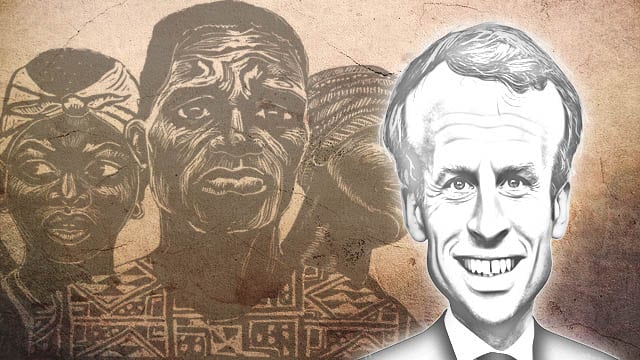
Despite being a poor continent, Africa is home to abundant natural resources. France got an unhindered right to exploit the natural resources of its former colonies under the neocolonial arrangements, which continues to prevent these African countries, located in the western Sahel region, from pursuing an independent development path.
France holds the national reserves of 14 African countries – Benin, Burkina Faso, Cameroon, Central African Republic, Chad, Congo-Brazzaville, Equatorial Guinea, Gabon, Guinea-Bissau, Ivory Coast, Mali, Niger, Senegal, Togo.
Under stringent neocolonial treaties, the African countries have to deposit their national currency reserves with the Bank of France. The French treasury receives about $500bn in earnings and returns from Africa annually.
The central banks of these African countries are obliged to keep at least 65% of their foreign exchange reserves in France to repay their financial debts.
These African countries have to deposit more than 80% of their foreign exchange reserves in “transaction accounts” controlled by the French Treasury.
The former colonies must pay France for the infrastructure that the latter had built during its colonial rule. They also have to give priority to French companies whenever there is a national tender for any project.
Apart from the economic exploitation, these countries are bound to allow France to set up and maintain permanent military bases in their countries.
France has the right to militarily intervene in these countries if its interests are at stake. The governments of these 14 countries are also bound to ally with France in case of a war against it.
Moreover, these governments are forced to impose French as an official language of correspondence and must use CFA Franc as their national currency.
However, the tide has turned. France now finds a mutiny on its hands as Africa chooses decolonisation.
The mutinies
On the eve of the Second Russia-Africa Summit, a coup d’état took place in Niger on July 26th, where the pro-western government was ousted by the military and the interim government declared that it won’t allow further exploitation of rich resources by the West.
Though China and Russia didn’t support the coup in Niger, the Sahel countries like Burkina Faso and Mali extended support to the new government of Niger.
Burkina Faso and Mali threatened the pro-western Economic Community of West African States (ECOWAS) bloc that any military intervention in Niger by it on behalf of France would be considered as a war against them too.
Even its northern neighbour Algeria, a former French colony, also announced that it won’t sit idle if the ECOWAS—considered as Africa’s NATO—launches any military campaign against Niger.
Even the threat to stop aid from the West didn’t budge the new Nigerien government, which has since emphasised making the country self-reliant by trading its resources.
A similar anti-western coup in Gabon, another country in the Sahel region has caused further ignominy for the West, especially France. The toppling of the pro-western government by the military has been supported by the majority of the people in Gabon.
China and Russia reportedly helped African countries like Egypt and Ethiopia become a member of the BRICS. This decision has helped in shining the prospects of the BRICS bloc, as more African countries now seek its membership.
Why Africa is important to BRICS?
Natural resources
Topping the interests is trade in natural resources. BRICS members are major players in the trading of natural resources in many African countries including Angola, the Democratic Republic of Congo, Nigeria and Sudan.
Brazil, China and India are actively engaged in exploring gas, oil and minerals resources in Africa. The presence of these BRICS members in the natural resources sector has brought large investments in various infrastructure projects in recent years to the continent.
Agriculture sector
Around 26% of the FDI from the BRICS members has gone towards the agriculture sector in African countries, which is vital for the continent’s economies.
The BRICS countries are promoting their experiences in agricultural development in Africa to help the latter unlock its potential and achieve long-term food security, which has been a perennial issue for the continent.
As a leading global player in agricultural commodity trading, Brazil aspires to be a role model for African countries and has the potential to help the countries increase their agricultural productivity, thereby reducing their reliance on food aid.
New markets to explore
What attracts the BRICS members is the diversification of the African economies, which offers them the chance to enter a largely untapped market with over 1.4bn population.
The economic meltdown in the West, especially in the US, has been motivating the BRICS countries to shift a significant part of their investments to the emerging economies to maximise their returns on investments (RoI), at lowered risks.
Information technology, telecommunications, financial services and retail industries have recorded high growth in several African countries due to high demand, creating a vast opportunity for the BRICS members to invest and tap the markets.
De-dollarisation and multipolarity
China and Russia have discussed switching to local currency trading between countries of the BRICS and Putin even emphasised national currency-based trading with African countries to avoid the US institutions.
Even the non-BRICS African countries have been contemplating breaking free of the US dollar dependency to strengthen their respective national currencies and ensure swifter trade and commerce among the countries of the continent.
West African Monetary Zone (WAMS) members—Gambia, Ghana, Guinea, Liberia, Nigeria and Sierra Leone— concluded a successful pilot scheme on the Pan-African Payment and Settlement System (PAPSS). This system was initiated in 2019 and has been recently relaunched in Ghana’s capital Accra.
The PAPSS platform focuses on the promotion of trade within the African Continental Free Trade Agreement (AfCFTA), which has a market value of $3 trillion. African countries can leverage the PAPSS to increase the demand for their local goods and services, which will help them strengthen their local currencies.
At present, intra-continental trade needs the respective countries to get foreign currencies, like the US dollar or British pound, to be converted through a foreign intermediary into their local currencies. Over 80% of cross-border trade in Africa is rerouted to foreign countries, which prolongs the transactions, causing inconvenience to traders, especially small and medium enterprises.
De-dollarisation—and delinking with all western currencies—will enhance the trading quality and reduce transaction durations for cross-border trade in Africa, which would benefit the sellers, buyers and governments.
With the BRICS members still divided on the use of a common currency but agreeing on using national currencies for their trading, it would be beneficial if they trade with the AfCFTA members in their currencies.
Apart from PAPSS, the ECOWAS countries have been mooting the idea of shunning the CFA Franc and adopting a common currency called ECO. However, as this pro-western clique’s membership criteria are set quite high in terms of debt to GDP ratio, most countries can’t benefit from it.
If the African Union’s G20 membership is confirmed then it will also give the economies of the 55 member states a boost and enable them to strongly put forward their demand for national currency usage in bilateral and multilateral trading.
The road ahead
The African Union’s G20 membership is nearly sealed. It’s to be seen how the continent can derive mileage from the membership and use the opportunity to increase its trading and strengthen the economies of its member states.
What’s more important at this point is to see how the anti-colonial sentiments of the people get manifested in these forums and whether the African Union members or at least the majority of them, can unshackle themselves from neocolonial exploitation and achieve economic growth by marching independently.
Tanmoy Ibrahim is a journalist who writes extensively on geopolitics and political economy. During his two-decade-long career, he has written extensively on the economic aspects behind the rise of the ultra-right forces and communalism in India. A life-long student of the dynamic praxis of geopolitics, he emphasises the need for a multipolar world with multilateral ties for a peaceful future for all.

